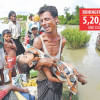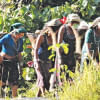Why food crisis in Thanchi?
The report in this paper, carrying the news of a large number of families in near starving condition in Thanchi upazilla of Bandarban is grim as well as shocking. That in these days of enhanced capacity of physical mobility people would be going without food for days, even if it were in the remotest part of the country, is unthinkable and unacceptable.
Reportedly, these people have been facing severe food shortage for days, and have been foraging the jungle for eatables like wild potatoes for sustenance. This situation has been prevailing for more than a month in that area covering several unions and affecting several thousand people. This has been brought about by the failure of the locals to cultivate jhoom crops adequately due to incessant rain last year compounded by vermin attacks on whatever little that was harvested; this year has been even worse. Regrettably, the upazilla agricultural officers had not visited the area at all to take a stock of the situation.
Apparently, the crop situation and the consequence of it were not addressed seriously, if at all, by the administration last year, nor has the food situation monitored this year. Had it been so, the circumstances would not have been so grim. Understandably, the communication link to those areas is tortuous and that is all the more reason for the local administration to have sought emergency support from the government to reach food to the affected people rather than waiting for the food, allotted only a couple of days ago, to reach them overland. It may also be worth considering building up small buffer stocks at nodal points all over the CHT region to meet such emergency situation.

 For all latest news, follow The Daily Star's Google News channel.
For all latest news, follow The Daily Star's Google News channel. 






Comments